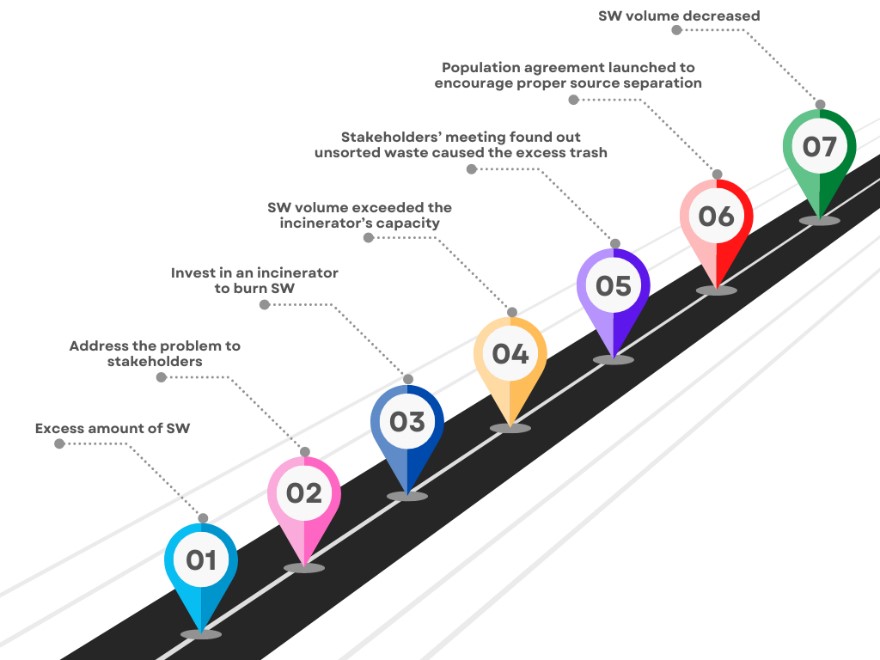Utilizing Wasteaware Benchmark Indicators to Improve Municipal Solid Waste Management in Northern Thailand
Main Article Content
Abstract
Primarily responsible for waste collection and disposal, local governments in northern Thailand face significant obstacles in managing waste. Mixing infectious, hazardous and general waste, over-utilizing incinerators and implementing environmentally improper disposal methods all contribute to burgeoning volumes of waste with adverse environmental and health impacts. The objectives of this study are to use the Wasteaware benchmark indicators (WABIs) to assess the effectiveness and sustainability of the waste management of Wiengthoeng Sub-district Municipality (WSM), to identify advantages and disadvantages of its system and offer fact-based recommendations for improvement. Pertinent data was obtained through interviews of governmental authorities, community members and private sector employees between October, 2020 and May, 2021 using designed questionnaires and through review of official governmental records. It was found that with the help of village leaders, increased public participation in MSWM and working with local governments resulted in more widespread involvement in the 3Rs practices. Economic measures facilitated the objectives. Assessing ‘pay-as-you-throw’ fees resulted in a focus on lowering household costs through waste separation and reduction. The financial benefits of the program were not significant, but the source waste required for final disposal was reduced. The findings suggest that to increase the sustainability of municipal solid waste management, source reduction and segregation should be promoted to minimize the volume of refuse sent to landfills. Source reduction and collaboration between residents and village leaders can provide more long-term benefits than positive short-term economic impacts. Moreover, to improve the sustainability of its physical assets, WSM must better address the environmental impact of waste treatment and disposal.
Article Details

This work is licensed under a Creative Commons Attribution-NonCommercial 4.0 International License.
Published articles are under the copyright of the Applied Environmental Research effective when the article is accepted for publication thus granting Applied Environmental Research all rights for the work so that both parties may be protected from the consequences of unauthorized use. Partially or totally publication of an article elsewhere is possible only after the consent from the editors.
References
References
Gutierrez Galicia, F., Coria Paez, A. L., & Tejeida Padilla, R. A study and factor identification of municipal solid waste management in mexico city. Sustainability, 2019, 11(22), 6305.
Hoornweg, D., & Bhada-Tata, P. What a waste: a global review of solid waste
Management, 2012.
Wilson, D. C., Velis, C. A., & Rodic, L. Integrated sustainable waste management in developing countries. In Proceedings of the Institution of Civil Engineers-Waste and Resource Management, 2013 May, Vol. 166, No. 2, pp. 52-68). ICE Publishing.
Kabera, T., Wilson, D. C., & Nishimwe, H. Benchmarking performance of solid waste
management and recycling systems in East Africa: Comparing Kigali Rwanda with other major cities. Waste Management & Research, 37(1_suppl), 2019, 58-72.
Wilson, D.C., et al. User Manual for Wasteaware ISWM benchmark indicators:
supporting information to Wilson et al.,2014.
Pollution Control Department. Thailand State of Pollution Report 2021. Pollution Control Department, Bangkok, 2021.
Pollution Control Department. State of Pollution in 2019. Pollution Control Department, Bangkok, 2020a.
Pollution Control Department. Solid waste management 5-year master plan for 2016-2021. Pollution Control Department, Bangkok, 2016.
Awasthi, A. K., Cheela, V. S., D’Adamo, I., Iacovidou, E., Islam, M. R., Johnson, M., ... & Li, J.. Zero waste approach towards a sustainable waste management. Resources, Environment and Sustainability, 2021, 3, 100014.
Lebreton, L. C., Van Der Zwet, J., Damsteeg, J. W., Slat, B., Andrady, A., & Reisser, J. River plastic emissions to the world’s oceans. Nature communications, 2017, 8(1), 1-10.
Kallayanapattharasit, R. Legal Crisis and Municipal Waste Management: Law
Enforcement Issues at the Operational Level. CMU Journal of Law and Social Sciences, 2021, 14 ( 1).
Manomaivibool, P., Srivichai, M., Unroj, P., & Dokmaingam, P. Chiang Rai Zero
Waste: Participatory action research to promote source separation in rural areas. Resources, Conservation and Recycling, 2018, 136, 142-152.
Unroj, P. Good practices for people's participation in the solid waste management of
Wiengthoeng Sub-district Municipality, Thoeng District, Chaingrai Province-turned from a
crisis to an opportunity. Environmental Journal, 2021, year 25th (issue 1).
Wilson, D. C., Rodic, L., Cowing, M. J., Velis, C. A., Whiteman, A. D., Scheinberg, A., ... &
Oelz, B. ‘Wasteaware’benchmark indicators for integrated sustainable waste management in cities. Waste management, 2015, 35, 329-342.
LUZ, F. G. F., ROZENSKÝ, L., VRBA, Z., HANSEN, J. M., Jan, L. Í. P. A., DOLISTA, J., ... & de CASTRO, M. C. A. A. Assessment of municipal waste management systems using performance indicators to analyze recycling capacity The case study of Corumbataí basin, São Paulo state, Brazil. In WASTE, 2021, p. 61.
Yang, Y. Assessment of the Wasteaware indicator for selected cities in the US and China. The Earth Resources Engineering thesis in Department of Earth and Environmental Engineering, Earth and Engineering Center, Columbia University, 2018.
Chanhthamixay, B., Vassanadumrongdee, S., & Kittipongvises, S. Assessing the sustainability level of municipal solid waste management in Bangkok, Thailand by wasteaware benchmarking indicators. Applied Environmental Research, 2017, 39(3), 49-61.
Wiengthoeng Sub-district Municipality. Waste management statistics for
Wiengthoeng Sub-district Municipality. Department of Public Health and Environment, 2021.
Wang, H., Li, J., Mangmeechai, A., & Su, j. Linking Perceived Policy Effectiveness and Proenvironmental Behavior: The Influence of Attitude, Implementation Intention, and Knowledge, Int.J.Environ. Res. Public Health. 2021, 18, 2910.
Papargyropoulou, E., Lozano, R., Steinberger, J. K., Wright, N., & bin Ujang, Z.
The food waste hierarchy as a framework for the management of food surplus and food waste. Journal of cleaner production, 2014, 76, 106-115.
Boonrod, K., Towprayoon, S., Bonnet, S., & Tripetchkul, S. Enhancing organic waste separation at the source behavior: a case study of the application of motivation mechanisms in communities in Thailand. Resources, Conservation and Recycling, 2015, 95, 77-90.

